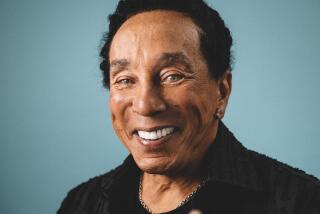VIDEORGY: In the mid-’60s, during one of...
VIDEORGY: In the mid-’60s, during one of the many peaks of his career, Marvin Gaye was booked into a prestigious nightclub in San Francisco. As Motown Records founder Berry Gordy recalls, after the emcee teased the crowd with a long litany of Gaye’s chart-topping hits, the singer finally strolled on stage, armed with a top hat and cane. Disposing of all his pop classics in a 2 1/2-minute medley, Gaye said, “Let’s get into some real music” and started crooning “You’re Nobody Till Somebody Loves You.”
To say Gaye was unpredictable--to use a favorite Gordy phrase--is an understatement. In fact, after seeing the latest installment of “Motown on Showtime,” a fascinating hourlong portrait of Gaye that airs tonight at 8 on the cable channel, you’ll still marvel at Gaye’s chameleon-like sorcery. Elegant and impish, silky but sulky, Gaye was an irresistible--and ultimately tragic--pop hero. The Showtime special doesn’t always probe as deeply as it might, yet it offers fresh insights into Gaye’s triumphs, his tumultuous private life and his untimely death, in 1984, of a shotgun blast from his own father.
Thanks to tons of rare footage, we see Gaye in his pride ‘n’ joy prime--surrounded by miniskirted go-go dancers on a pop TV program as well as crooning a sassy version of “I’ll Be Doggone” with a girlish Tina Turner. There are also never-before-seen home movies, a classic performance of “I Heard It Through the Grapevine” with Gladys Knight (worth seeing just for Gaye’s dance routine with the Pips) and an absolutely stunning scene where Gaye, in mirrored shades, works wonders with the National Anthem at the 1983 NBA All-Star Game.
Gaye’s final years were clearly full of woe--as his mother, Alberta Gay, bluntly puts it: “It was no secret that Marvin had taken too much drugs.” In the ‘80s clips, Gaye is the quintessential “Trouble Man”--distant, disoriented, seemingly despondent. You feel the chill of a man who’s soul was on ice. Gaye’s voice is barely a whisper, as if coming from a faraway radio station. In one of his final interviews, Gaye seemed to offer his own eulogy. “I only really want to feel one thing from music,” he said sorrowfully. “And that’s a sad refrain, because the world as I see it through my eyes can only be recalled sadly.”
More to Read
The biggest entertainment stories
Get our big stories about Hollywood, film, television, music, arts, culture and more right in your inbox as soon as they publish.
You may occasionally receive promotional content from the Los Angeles Times.










